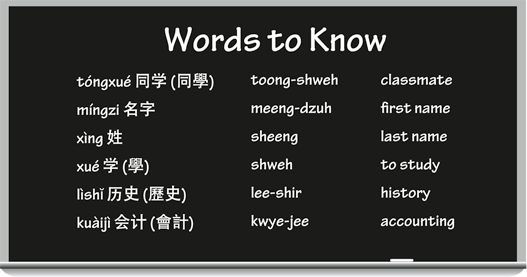Chinese For Dummies (22 page)
Read Chinese For Dummies Online
Authors: Wendy Abraham
Conversing around the clock
You can always say
nÇ hÇo
when you meet someone, but at certain times of the day, you can use specific ways to express your greetings.
When you meet family, friends, co-workers, or fellow students in the morning, you can say
ZÇo.
æ©
. (dzaow.) (
Good morning.
) or
ZÇo Än.
æ©å®
. (dzaow ahn.) (
Good morning.
[Literally:
early peace
]).
 Â A word about culturally acceptable behavior
 A word about culturally acceptable behavior
The Chinese are very friendly people and sometimes don't hesitate to come up to a foreigner on the street in order to practice their English. Such a situation can be a great chance to practice your Chinese as well. You have all sorts of cultural differences to get used to, however, so don't be surprised if a person you meet for the first time starts asking you about your salary or the cost of that cute sweater you're wearing. Subjects that are taboo as conversation pieces in the United States aren't off limits in China. (Try not to inquire about a person's political views or love life unless you know the person really well, though, or you may hit a brick wall.)
In general, Chinese people are loath to show negative emotions in public. Anger and disappointment or disapproval are major no-nos. Try to do the same when you're in a Chinese setting, because you may run the risk of insulting someone unintentionally. To do so means that you make them lose face â a cardinal sin if you want to get along in China. The last thing you want to do is insult, yell at, or otherwise embarrass anyone publicly, so keep a lid on any negative reactions you may have. You earn respect by controlling your emotions.
You may be surprised that many Chinese have no compunction about performing certain bodily functions in public. The Chinese don't consider it rude, for example, to belch, spit, or even pass gas in front of others. And because there's no such thing as a nonsmoking area, most smokers don't even think to ask whether you mind their lighting up near you. In addition, you may find people pointing or even staring at you â especially in smaller towns and villages, which rarely get foreign visitors. These behaviors are considered perfectly acceptable, so don't let them get your dander up. Just go with the flow and offer a polite smile in return.
The Chinese have a different idea about keeping a certain polite physical distance when speaking to someone. You'll commonly find someone standing or sitting pretty close to you, no matter how much you keep trying to inch away. And if you find two friends of the same sex walking arm in arm or holding hands, don't jump to any conclusions. It just means that they're friends.
Note:
Despite the more relaxed view of personal space, however, avoid slaps on the back to Chinese people you don't know well, no matter how excited you are to meet them. And when dealing with members of the opposite sex, any physical contact with folks you don't know too well will be misinterpreted, so try to avoid it.
In the evening or before you go to sleep, you can say
WÇn Än.
æå®
. (wahn ahn.) (
Good night.
). Just as
zÇo
means early,
wÇn
means late. So if someone says
NÇ lái de tà i wÇn.
ä½ æ¥å¾å¤ªæ.
(
ä½ ä¾å¾å¤ªæ.
) (nee lye duh tye wahn.) or
NÇ lái de tà i zÇo.
ä½ æ¥å¾å¤ªæ©.
(
ä½ ä¾å¾å¤ªæ©.
) (nee lye duh tye dzaow.), he means
You came too late.
or
You came too early.
Talkin' the Talk
Julia and Christopher are good friends who meet in front of school one morning. Julia introduces Christopher to a new student named LÇ.
Julia:
ZÇo. NÇ zÄnme yà ng?
dzaow. nee dzummuh yahng?
Good morning. How's it going?
Christopher:
HÄn hÇo, xièxiè. NÇ ne?
hun how, shyeh-shyeh. nee nuh?
Very well, thanks. And you?
Julia:
WÇ yÄ hÄn hÇo. Zhè wèi shì wÇmen de xÄ«n tóngxué.
waw yeah hun how. jay way shir waw-mun duh sheen toong-shweh.
I'm good, too. This is our new classmate.
Christopher:
NÇ hÇo. QÇng wèn, nÇ xìng shénme?
nee how. cheeng one, nee sheeng shummuh?
Hi. What's your (sur)name?
LÇ:
WÇ xìng LÇ. NÇ jià o shénme mÃngzi?
waw sheeng LÇ. nee jyaow shummuh meeng-dzuh?
My last name is LÇ. What's your (first) name?
Christopher:
WÇ jià o Christopher. NÇ xué shénme?
waw jyaow Christopher. nee shweh shummuh?
My name is Christopher. What do you study?
LÇ:
WÇ xué lìshÇ. NÇ ne?
waw shweh lee-shir. nee nuh?
I study history. How about you?
Christopher:
WÇ xué kuà ijì.
waw shweh kwye-jee.
I study accounting.

Talking about the weather
Talking about the
tiÄnqì
天æ°
(
天氣
) (tyan-chee) (
weather
) is always a safe topic in any conversation. In fact, it's kind of the universal ice breaker. If the skies are blue and all seems right with the world, you can start by saying
JÄ«ntiÄn de tiÄnqì zhÄn hÇo, duì bú duì?
ä»å¤©ç天æ°ç好
,
对ä¸å¯¹
? (
ä»å¤©ç天氣ç好
,
å°ä¸å°
? ) (jin-tyan duh tyan-chee juhn how, dway boo dway?) (
The weather today sure is nice, isn't it?
) Here are some adjectives to describe temperature and humidity:
 lÄng
lÄng
å·
(lung) (
cold
)
 liángkuà i
liángkuà i
åå¿«
(
涼快
)
(lyahng-kwye) (
cool
)
 mÄnrè
mÄnrè
é·ç
(
æ¶ç±
)
(mun-ruh) (
muggy
)
 nuÇnhuó
nuÇnhuó
æå
(nwan-hwaw) (
warm
)
 rè
rè
ç
(
ç±
) (ruh) (
hot
)
 Only use the word
Only use the word
rè
to describe hot weather. For food that's hot temperature-wise, you say
tà ng
ç«
(
ç
) (tahng). And if your food is spicy hot, you have to say it's
lÃ
è¾£
(lah) instead.